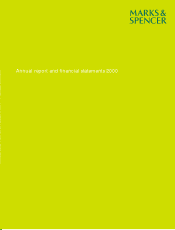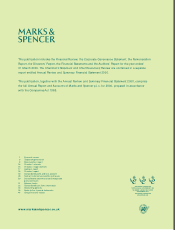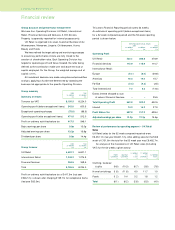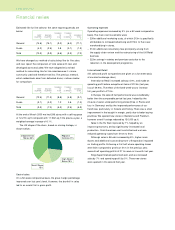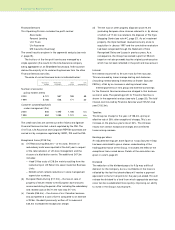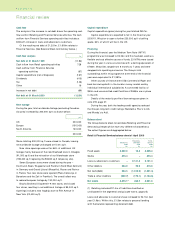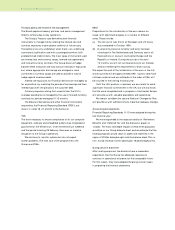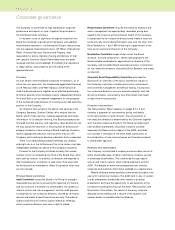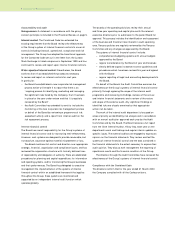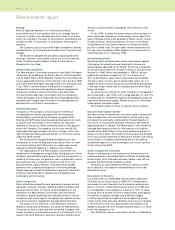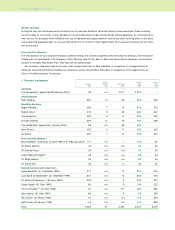Marks and Spencer 2000 Annual Report Download - page 10
Download and view the complete annual report
Please find page 10 of the 2000 Marks and Spencer annual report below. You can navigate through the pages in the report by either clicking on the pages listed below, or by using the keyword search tool below to find specific information within the annual report.
Strategy
Marks & Spencer operates in an international trading
environment and it is an essential part of our strategy that we
continue to attract, train, develop and retain talent at all levels
within the Company. The level of remuneration and benefits we
are able to offer is a key factor in successfully achieving this
objective.
The Company sets out to provide highly competitive salaries
and benefits for all its employees consistent with its growth and
strategy.
The Board has adopted the principles of good governance
relating to directors’ remuneration as set out in the Combined
Code. This Remuneration Report follows the provisions in
Schedule B to the Code.
Remuneration Committee
The Remuneration Committee comprises Dame Stella Rimington
(Chairman), Brian Baldock, Sir Martin Jacomb, Sir Michael Perry
and Sir Ralph Robins. Brian Baldock chaired the Committee until
he was appointed Chairman of the Company from 23 June 1999,
and Dame Stella Rimington was appointed as his successor from
1 July 1999. It recommends to the Board the Company’s
framework for retaining and rewarding its senior management,
ie executive directors, divisional directors and executives.
The Committee’s approach is consistent with the Company’s
overall philosophy that all employees should be appropriately
rewarded and it keeps itself informed of the developments in
best practice in the field of remuneration.
Remuneration policy
The policy of the Company aims to align the interests of
all employees as closely as possible with the interests of
shareholders in promoting the Company’s progress. Profit
Sharing and SAYE schemes encouraging employees at all levels
to acquire and hold shares in the Company are important
elements of that policy. Share ownership remains very popular
within the Company, illustrated by the fact that over 43,000
employees hold approximately 34 million shares in their own
right and 38,000 employees hold options on 79 million shares
under the SAYE scheme.
The Government has published draft legislation for the
introduction of a new All-Employee Share Option Plan. In order
to continue offering Profit Sharing to our employees, we are
seeking shareholder approval to operate a new scheme.
The responsibility of the Remuneration Committee is to
reward senior management competitively taking account of both
Company and individual performance. The total remuneration is
made up of three major components: salary and benefits, annual
bonus scheme and a long-term incentive in the form of an
Executive Share Option Scheme. The performance related
elements form a significant proportion of the total package.
Targets required to meet the thresholds of payment under both
the bonus and share option schemes are considered to be
challenging and motivating.
Salary and benefits
Salary should be competitive and appropriate reviews should
take place, normally annually, reflecting market conditions and
personal performance. In making recommendations on the
framework the Remuneration Committee uses information
available in specific published job-matched surveys of similar
companies and annual reports. As appropriate, specific surveys
are commissioned to supplement the published information.
The salaries of the Chairman, Chief Executive, executive
directors and divisional directors, are set by the Remuneration
Committee in June of each year after reviewing Company and
market conditions and the performance of the individual. In the
cases of the Chief Executive, executive directors and divisional
directors, the Committee is assisted by the Chairman in this
review.
In July 1999, to reflect the performance of the business, no
senior employee received an annual salary review, apart from
salary increases which were awarded to Robert Colvill, Group
Finance Director, and Clara Freeman, Director of UK Stores,
Group Personnel and Communications to reflect the market
position of these roles. The year under review reflects the first
full year salary awarded to Peter Salsbury on his promotion to
Chief Executive from 1 February 1999.
Annual bonus scheme
Bonus payments are based upon actual achievement against
challenging Group performance targets set in the annual
operating plan approved by the Board. The Group introduced
an annual bonus scheme for executive directors and divisional
directors in 1988, which was extended in 1995 to include
executives. The bonus ranges from 0% to a maximum of
30% of participants’ salary when target levels are exceeded.
The bonus does not form part of pensionable salary, nor is it
eligible for profit sharing. No bonus was earned by participants
in the year under review due to Company performance being
below set targets.
An annual bonus scheme for other members of management
was introduced in July 1999, with a range between 0% and 10%
of salary paid for achievement against challenging business and
individual performance targets. Awards of up to 5% have been
made against individual targets.
The Company does not have a long-term bonus scheme.
Executive Share O ption Scheme
We have looked at alternatives to the share option scheme and
after consideration we have continued to use the policy and
principles that are readily understood by the participants, fit
the culture of the business and have historically delivered an
appropriate level of reward. The Remuneration Committee has
imposed performance criteria for the exercise of all options
granted since 1996. Details of the share schemes are given in
section 6 of this report. The needs of the business have dictated
that in pursuing the objective of being more flexible and linking
more closely to Company performance we will be seeking
shareholder approval to make changes to our current scheme
at the forthcoming AGM.
Senior management restructure
As part of the process of the restructure of the business, five
executive directors, James Benfield, Lord Stone of Blackheath,
Derek Hayes, Chris Littmoden and John Sacher, have left the
business and Sir Richard Greenbury retired.
The policy for Early Retirement Pension, details of which
are in section 5, facilitated the implementation of the new
Business structure.
Recruitment of directors
During the year Luc Vandevelde was recruited as Executive
Chairman on an annual salary of £650,000. Compensation
was made for loss of benefits from his previous employment,
given in the form of restricted shares at a cost of £1,997,000.
Luc Vandevelde is also eligible for a bonus of 100% of salary
covering his first thirteen months of employment, paid against
the delivery of specific strategic and qualitative targets.
In following periods his targets will be set against the same
criteria as the other executive directors. As he was not resident
in the UK at the time of his appointment, the Company has
agreed to provide him with suitable accommodation, on which
he will be assessed for tax.
Alan McWalter was also recruited as Director of Marketing.
8Marks and Spencer p.l.c.
Remuneration report

